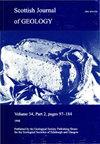讨论“罗伯特·詹姆森在爱丁堡大学的演讲中所反映的从海王星到钚的转变,1820–33”:《苏格兰地质学杂志》,56,85–99,https://doi.org/10.1144/sjg2019-031
IF 0.5
4区 地球科学
Q4 GEOLOGY
引用次数: 0
摘要
斯通(2020)在对罗伯特·詹姆逊从海王星主义(由亚伯拉罕·维纳推动)转变为钚主义(由詹姆斯·赫顿的思想发展而来)的过程进行了富有启发性的回顾,他广泛借鉴了詹姆逊的一些学生在1820年至1833年间所做的现存讲义。有人顺便提到了詹姆森作为苏格兰冰川作用早期支持者的角色,但引用的次要文献来源主要来源于詹姆森的另一位学生詹姆斯·大卫·福布斯(1809-68)的笔记,这些笔记现在保存在圣安德鲁斯大学图书馆的特藏中,但斯通没有使用。詹姆斯·福布斯(James Forbes)——不要与著名的海洋生物学家爱德华·福布斯(Edward Forbes,1815-54)混淆,后者于1854年接替詹姆森成为爱丁堡大学自然史系主任——用他的传记作者弗兰克·坎宁安(Frank Cunningham,1990)的话说,他是“苏格兰冰川学家的先驱”。1827-28年,福布斯参加了詹姆逊在爱丁堡大学的自然史讲座,并于1828-29年复课。《福布斯》的笔记为斯通引用的笔记提供了宝贵的补充。Cunningham(1990年,第14页)记载,根据《福布斯》的笔记,詹姆森“对待他的学生完全是韦纳式的地质学”。《福布斯》的笔记也为斯通推断的詹姆森皈依的时间提供了额外的约束;1828年,他是一位彻底的韦纳式海王星学家,但到1830年,他皈依了冥王星主义。关于冰川作用,福布斯在1827年11月27日詹姆逊第12次演讲的笔记中写道:本文章由计算机程序翻译,如有差异,请以英文原文为准。
Discussion on ‘Robert Jameson's transition from Neptunism to Plutonism as reflected in his lectures at Edinburgh University, 1820–33’: Scottish Journal of Geology, 56, 85–99, https://doi.org/10.1144/sjg2019-031
In his illuminating review of the progress of Robert Jameson’s conversion from Neptunism (promoted by Abraham Werner) to Plutonism (developed from the ideas of James Hutton), Stone (2020) drew extensively on the extant lecture notes taken by some of Jameson’s students between about 1820 and 1833. Mention was made in passing of Jameson’s role as an early proponent of Scottish glaciation, but the secondary literature sources cited have their primary origin in the notes of another of Jameson’s students, James David Forbes (1809–68), which are now held in the Special Collections of the University of St Andrews Library but were not utilized by Stone. James Forbes – not to be confused with the eminent marine biologist, Edward Forbes (1815–54), who succeeded Jameson to the chair of Natural History at the University of Edinburgh in 1854 – was, in the words of his biographer, Frank Cunningham (1990), a ‘pioneer Scottish glaciologist’. Forbes attended Jameson’s lecture course in Natural History at the University of Edinburgh in session 1827–28 and repeated the class in 1828–29. Forbes’ notes provide a valuable complement to those cited by Stone. Cunningham (1990, p. 14) records that, on the basis of Forbes’ notes, Jameson ‘treated his students to a thoroughly Wernerian version of geology’. Forbes’ notes also provide additional constraint to the timing deduced by Stone for Jameson’s conversion; he was a thoroughly Wernerian Neptunist in 1828 but a convert to Plutonism by 1830. With regard to glaciation, Forbes records in his notes from Jameson’s lecture 12 on 27 November 1827:
求助全文
通过发布文献求助,成功后即可免费获取论文全文。
去求助
来源期刊

Scottish Journal of Geology
地学-地质学
CiteScore
1.70
自引率
0.00%
发文量
10
审稿时长
>12 weeks
期刊介绍:
Although published only since 1965, the Scottish Journal of Geology has a long pedigree. It is the joint publication of the Geological Society of Glasgow and the Edinburgh Geological Society, which prior to 1965 published separate Transactions: from 1860 in the case of Glasgow and 1863 for Edinburgh.
Traditionally, the Journal has acted as the focus for papers on all aspects of Scottish geology and its contiguous areas, including the surrounding seas. The publication policy has always been outward looking, with the Editors encouraging review papers and papers on broader aspects of the Earth sciences that cannot be discussed solely in terms of Scottish geology.
The diverse geology of Scotland continues to provide an important natural laboratory for the study of earth sciences; many seminal studies in geology have been carried out on Scottish rocks, and over the years the results of much of this work had been published in the Journal and its predecessors.
The Journal fully deserves its high reputation worldwide and intends to maintain its status in the front rank of publications in the Earth sciences.
 求助内容:
求助内容: 应助结果提醒方式:
应助结果提醒方式:


